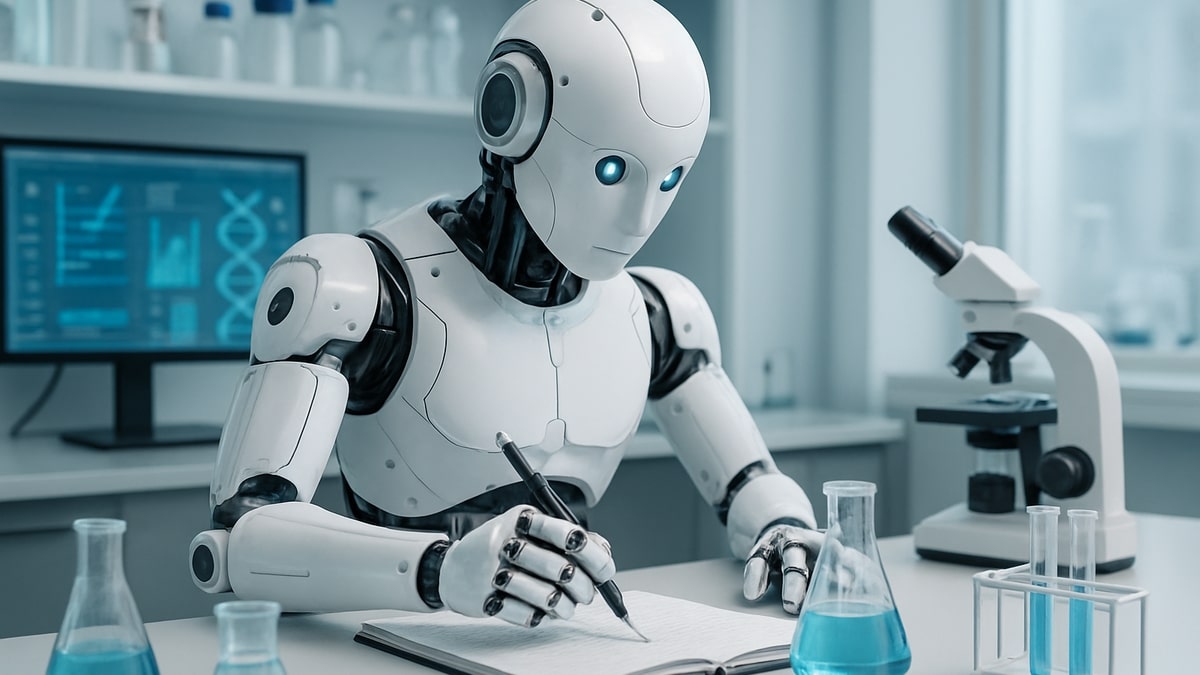The article AI in science: Fake research for advanced users first appeared at the online magazine Basic Thinking. You can start the day well every morning via our newsletter update.

The influence of AI on science grows rapidly – with negative consequences. Because: The number of incorrect quotations, invented studies and fake articles increases massively. The previous control measures of magazines and universities are no longer sufficient. A new business model is needed.
Background: AI in science
- Diomidis SpinellisProfessor of Software Engineering at the University of Economics and Business in Athens, specifically deals with fake AI quotes. One of his own texts published in the BMC journal was quoted 53 times. 48 of these quotes were in scientific works that were created entirely by AI. In the remaining five cases, AI was at least partially deployed. He has his findings in a study of their own published.
- The American science journalist Carl Zimmer has in a detailed article in the New York Times deals with the effects of artificial intelligence on research and science. Accordingly, the number of fake AI studies doubles every year-and the trend is rising.
- Artificial intelligence creates a black market in fake studies and theses in the field of science. A current Study at Northwestern University It has proven that systematic fraud in science rises quickly. In the meantime there are even more AI studies than real ones. Trust in science is therefore massive.
Classification: AI presents researchers with new challenges
AI poses a major challenge with science. The problem: The more fake quotes and fake studies appear and be published, the more the basic construct of science is in danger.
So far, researchers have gained new knowledge and thus enabled social and economic progress. New knowledge – for example in the field of genetics – has contributed to the fact that dangerous diseases could be successfully combated and that we humans live longer.
In return for this scientific help, researchers were equipped with generous financial resources and sufficient time to advance humanity by states, federal states and foundations.
This grown partnership is sustainably endangered by the new lover-artificial intelligence-because it is becoming increasingly difficult to distinguish real knowledge from AI-Hallucinations.
Voices
- Luis A. Nunes Amaral, Data Scientist at Northwestern University, says in one Interview with the New York Times With a view to the flood of fake AI studies: “If this trend is not stopped, science is destroyed. Science is based on trusting what others have said so that everything does not have to be repeated.”
- Liudmila Zavolokina, assistant professor at the University of Lausannereports in one LinkedIn post As she happened to have found out about an invented AI quote that allegedly comes from her: “I see countless risks related to this incident: risks of misinformation, loss of trust in academic research, collateral damage for science journals, distorted key figures for mentions and publications by authors, reputation damage for incorrectly cited scientists and legal risks.”
- Will Kitchen, lecturer at the University of Chichester and examiner at the University of Wolverhampten,, underline the dangers From the use of AI in science: “I asked a student to summarize my last book by AI and the summary was exactly the opposite of my argument. It looks like the AI only read the title and then got what I wrote.”
Outlook: AI could do it to do with science
The first steps in the field of artificial intelligence were celebrated as gigantic progress and great achievements. Now it shows – as in a good start of the world – that the scientific wonder child could be doomed to its creators.
So that it does not come to this, researchers and journalists have to start checking the previous control measures and creating new standards for scientific and truth. As early as September 2024, the renowned knowledge magazine had to Springer Nature Withdraw 200 released AI publications.
If science does not succeed in overcoming their own laziness and working again seriously, not only students will benefit from artificial intelligence. No, sooner or later artificial intelligence itself becomes a professor, who passes on to the invented studies from invented studies to inquisitive people.
Also interesting:
- Technophobia? The AI resistance grows
- Overrated? Which threatens when the AI bubble bursts
- A AI goes to the doctor; Diagnosis: algorithm disorders
- Anyone who has AI as a friend no longer needs enemies
The article AI in science: Fake research for advanced players first appeared on Basic Thinking. Follow us too Google News and Flipboard Or subscribe to our update newsletter.
As a Tech Industry expert, I am deeply concerned about the potential for AI to be used to create fake research for advanced users in the field of science. This could have serious implications for the credibility and integrity of scientific research, as well as for the progress and advancement of knowledge in various fields.
It is crucial that researchers and scientists remain vigilant and cautious when utilizing AI in their work, and that they take steps to ensure the accuracy and authenticity of the data and findings they are presenting. This includes verifying the sources of data, conducting thorough peer reviews, and employing ethical and transparent practices in their research.
Furthermore, it is important for the tech industry to continue developing and implementing safeguards and technologies that can help detect and prevent the spread of fake research generated by AI. This includes tools for identifying and validating data, as well as mechanisms for tracking and tracing the origins of research outputs.
Overall, while AI holds great potential for advancing scientific research and discovery, it also poses significant challenges and risks that must be carefully managed and mitigated. By remaining vigilant and proactive in addressing these issues, we can ensure that AI continues to be a force for good in the scientific community.
Credits